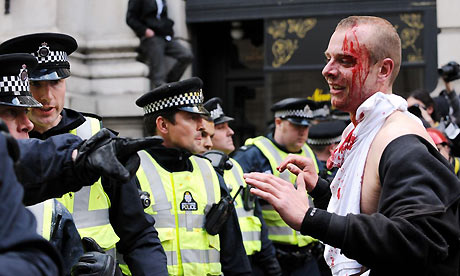At the G20 protests in London only one group appears to be looking for violent confrontation – and it's not the protesters

Force majeure ... are the police protesting too much? Photograph: Owen Humphreys/PA
The trouble-makers are out in force again. Dressed in black, their faces partly obscured, some of them appear to be interested only in violent confrontation. It's almost as if they are deliberately raising the temperature, pushing and pushing until a fight kicks off. But this isn't some disorganised rabble: these people were bussed in and are plainly acting in concert. There's another dead giveaway. They are all wearing the same slogan: Police.
The police have been talking up violence at the G20 protests for weeks. They briefed journalists and companies in the City of London about the evil designs of the climate campaigners intending to demonstrate there, but refused to let the campaigners attend the briefings and put their own side of the story. They also rebuffed the campaigners when they sought to explain to the police what they wanted to do.
The way officers tooled themselves up in riot gear and waded into a peaceful crowd this afternoon makes it look almost as if they were trying to ensure that their predictions came true. Their bosses appear to have failed either to read or to heed the report by the parliamentary committee on human rights last week, about the misuse of police powers against protesters. "Whilst we recognise police officers should not be placed at risk of serious injury," the report said, "the deployment of riot police can unnecessarily raise the temperature at protests."
But there has always been a conflict of interest inherent in policing. The police are supposed to prevent crime and keep the streets safe. But if they are too successful, they do themselves out of a job. They have a powerful interest in exaggerating threats and, perhaps, an interest in ensuring that sometimes these threats materialise. This could explain what I've seen at one protest after another, where peaceful demonstrations turn into ugly rucks only when the police attack. The wildly disproportionate and unnecessary violence I've sometimes seen the police deploy could scarcely be better designed to provoke a reaction.
If this is so, they lose nothing. They might get the occasional rap over the knuckles from MPs or the police complaints commission. It doesn't seem to bother them. By planting the idea in the public mind that the streets could erupt into catastrophic violence at any time, were it not for the thick blue line thrown around even the mildest protest, they establish the need for a heavy police presence. While the public lives in fear, no government dares to cut the policing budget.
Desculpem-me por todos estes posts do G20 mas quando um gajo e' abusado pela policia um gajo tem direito a ficar exaltado. E porque o mundo nao anda so' a' volta de futebol, claro.








Sem comentários:
Enviar um comentário